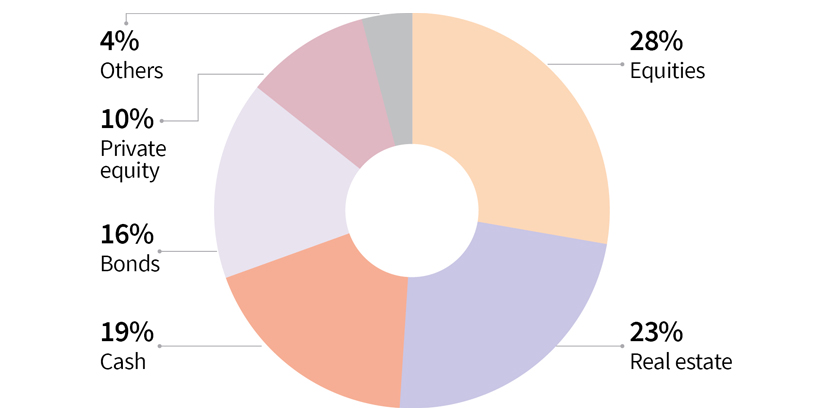Credit Score Damage: The Effects Of Missed Student Loan Payments

Table of Contents
How Missed Student Loan Payments Impact Your Credit Score
Student loan payments are reported to major credit bureaus – Experian, Equifax, and TransUnion – impacting your credit report and, consequently, your credit score. Missing payments results in negative marks, significantly impacting your creditworthiness. These negative marks can range from late payments to delinquency and, ultimately, default.
- Impact of Delinquency: The longer you're delinquent, the worse the impact. A 30-day late payment is less damaging than a 90+ day delinquency, which can severely impact your credit score.
- Severity of Impact: The number of missed payments, along with the length of the delinquency, determines the severity of the negative impact. Multiple missed payments will significantly lower your score compared to a single late payment.
- Credit Score Ranges (FICO Score): Missed payments can drastically reduce your FICO score, making it harder to qualify for loans and other financial products. Even a minor dip can affect your interest rates.
- Credit Utilization: Delinquent student loans can also increase your credit utilization ratio (the amount of credit you're using compared to your total available credit), further harming your credit score.
Long-Term Consequences of Damaged Credit from Student Loan Defaults
The long-term consequences of a damaged credit score due to student loan defaults are far-reaching and can significantly impact your financial life for years.
-
Difficulty Obtaining Future Loans: A poor credit score makes it significantly harder to qualify for auto loans, mortgages, and personal loans. Lenders view you as a higher risk.
-
Increased Interest Rates: Even if you do qualify for a loan, you'll likely face significantly higher interest rates, costing you substantially more money over the life of the loan.
-
Other Impacts:
- Rental Applications: Landlords often check credit scores, and a poor score can make it difficult to secure an apartment or rental property.
- Wage Garnishment: In cases of default, your wages can be garnished to repay the debt.
- Insurance Premiums: Your insurance premiums (auto, renters, homeowners) may increase due to a lower credit score.
- Employment: Some employers conduct credit checks, and a damaged credit score might negatively impact your job prospects.
Strategies to Protect Your Credit Score While Managing Student Loan Debt
Taking proactive steps to manage your student loan debt is crucial for protecting your credit score.
Budgeting and Financial Planning
Creating a realistic budget that prioritizes your student loan payments is paramount. Track your income and expenses to identify areas where you can cut back and allocate more funds towards your loans.
Exploring Repayment Options
Several repayment options can help you manage your student loan debt more effectively:
- Income-Driven Repayment Plans: These plans base your monthly payments on your income and family size. They can lower your monthly payments but may extend the repayment period.
- Deferment: This temporarily postpones your payments, but interest may still accrue.
- Forbearance: This temporarily reduces or suspends your payments, but interest typically continues to accrue.
Choosing the right plan depends on your individual circumstances. Carefully weigh the pros and cons of each option before making a decision.
Communicating with Your Loan Servicer
Proactive communication with your loan servicer is key. If you anticipate difficulty making a payment, contact them immediately to explore options like deferment or forbearance. Explain your situation and work together to find a solution before you default.
Credit Monitoring and Repair
Regularly check your credit reports from all three major credit bureaus (Experian, Equifax, and TransUnion) for errors and to monitor your score. If you have negative marks on your report, consider using credit repair services to help improve your score.
- Resources: The National Foundation for Credit Counseling (NFCC) and the Consumer Financial Protection Bureau (CFPB) offer resources and assistance with student loan repayment.
- Credit Monitoring Services: Consider using reputable credit monitoring services like Credit Karma, Experian, or Equifax to track your credit score and identify potential issues.
Maintaining a good credit history beyond student loans is essential for long-term financial health.
Conclusion
Missed student loan payments can have severe and long-lasting negative effects on your credit score, impacting your ability to secure loans, housing, and even employment. Understanding the potential consequences and proactively managing your student loan debt are crucial for protecting your financial future. Don't let missed student loan payments damage your credit score. Take control of your finances today by exploring repayment options, implementing effective budgeting strategies, and communicating proactively with your loan servicer. Learn more about protecting your credit and avoiding the negative effects of student loan default. Understanding the effects of missed student loan payments on your credit score is paramount for long-term financial well-being.

Featured Posts
-
 The Ultra Wealthy And The Luxury Real Estate Market Navigating Current Economic Uncertainty
May 17, 2025
The Ultra Wealthy And The Luxury Real Estate Market Navigating Current Economic Uncertainty
May 17, 2025 -
 47 Spike In Indias Real Estate Investments Q1 2024 Report
May 17, 2025
47 Spike In Indias Real Estate Investments Q1 2024 Report
May 17, 2025 -
 75 Million Gift To Build New U Of U Hospital In West Valley
May 17, 2025
75 Million Gift To Build New U Of U Hospital In West Valley
May 17, 2025 -
 15 Day Il For Mariners Bryce Miller Elbow Injury Sidelines Pitcher
May 17, 2025
15 Day Il For Mariners Bryce Miller Elbow Injury Sidelines Pitcher
May 17, 2025 -
 Thibodeaus Plea For Resolve Knicks Suffer Devastating 37 Point Loss
May 17, 2025
Thibodeaus Plea For Resolve Knicks Suffer Devastating 37 Point Loss
May 17, 2025
Latest Posts
-
 Playing At The Best Online Casinos A New Zealand Players Guide 7 Bit Casino Featured
May 17, 2025
Playing At The Best Online Casinos A New Zealand Players Guide 7 Bit Casino Featured
May 17, 2025 -
 Recession Proof Stocks Is Uber One Of Them
May 17, 2025
Recession Proof Stocks Is Uber One Of Them
May 17, 2025 -
 Discover The Best Online Casinos In New Zealand 7 Bit Casino Review Included
May 17, 2025
Discover The Best Online Casinos In New Zealand 7 Bit Casino Review Included
May 17, 2025 -
 Why Uber Stock Might Weather An Economic Downturn
May 17, 2025
Why Uber Stock Might Weather An Economic Downturn
May 17, 2025 -
 Real Money Online Casinos In New Zealand 7 Bit Casino And Other Top Choices
May 17, 2025
Real Money Online Casinos In New Zealand 7 Bit Casino And Other Top Choices
May 17, 2025
